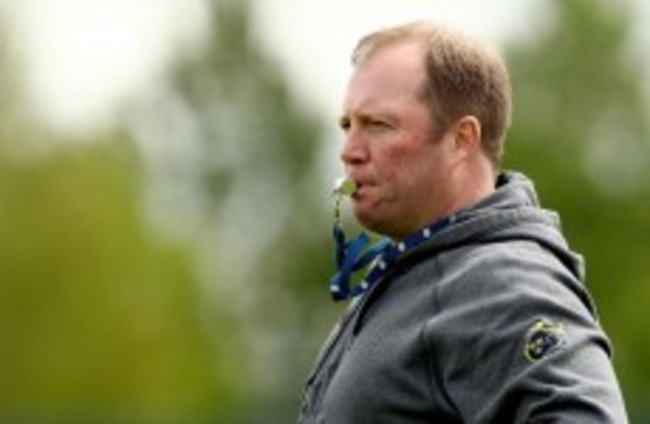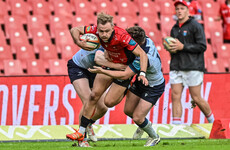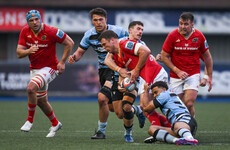Reproduced with permission from Whiff of Cordite
LUDD MCGAHAN’S DEPARTURE from Munster won’t see too many tears shed among the Munster faithful.
He has never fully won over the fans in his time there, and for most it will be a case of ‘bring on the new era’. His defenders will thank him for a good job, but won’t mind too much that he’s going deehn andah.
The truth of the matter is that McGahan’s task was a thankless, maybe even impossible one. He took over Munster at a time when they were the dominant team in Europe, but had grown old together. By his second season in charge, most of the core of his team were over the top of a pretty steep hill.
The only way was down. Plus, he was taking over from Local Hero and Man of the People, Declan Kidney.
To make matters worse, the previous management (of which he was a part, it must be said) had done little to manage succession. Declan Kidney was hugely successful for Munster, but, as a coach, rarely looks too far beyond the next game. As this superb dissection showed, during his time there, the academy produced next to no players of any quality.
Starter’s orders
The first few months of McGahan’s tenure went pretty swimmingly, though it’s hard to know how much to attribute to him, and how much was the continued good habits of a self-managing squad. His first Heineken Cup game flirted with disaster, as Munster came within a whisker of losing at home to Montauban’s seconds, but they quickly got their act together, navigating the double header with Clermont Auvergne and dispatching Sale home and away.
They also nearly beat the All Blacks on a famous night in Thomond Park. By now the Munster machine was purring. They put together a stirring run of form in both competitions. Even in the absence of their frontline players – traditionally a time for Munster to fold like a cheap suit – the likes of Mick O’Driscoll and Niall Ronan kept the show on the road.
The 22-5 beating of Leinster and the 43-9 crushing of the Ospreys in the quarter-final were arguably the very peak of their powers. The Lions selection reflected their machine-like brilliance, and retaining the H-Cup appeared a formality.
Head coach Tony McGahan speaks with the players. Pic: INPHO/Dan Sheridan
Rise of the Blue Meanies, part 1
Then something strange happened. A thoroughly unfancied Leinster, fed on scraps of their horrendous press and the meeja’s Munster love-in, beat them 25-6 in the semi-final. It was a game which effected a profound change on Irish rugby, and it took Tony McGahan and Munster a long time to recover.
Over the next 21 months the rot set in. The following year saw Munster win 9 out of 18 games in the Magners League, somehow squeezing into the newly minted semi-finals, where they were beaten by – not you again – Leinster in a game they never really threatened to win.
It was their third defeat of the season to their rivals – the first was a humiliating 30-0 thumping at a white-hot RDS, and the second a rare loss on their own Limerick patch. In the Heineken Cup, Munster huffed and puffed, but made it to a semi-final, but succumbed to a pretty ordinary Biarritz. Sheer muscle was all Biarritz had, and Munster had nothing to stop it.
Goodbye Generation Ligind
Worse trouble was brewing: Generation Ligind were coming to the end of the road. Marcus Horan and Denis Leamy’s powers were vastly reduced, John Hayes could give no more, Alan Quinlan was finished as a starter and Jirry Flannery was about to be ruined by injury. Paul O’Connell was injured and Donncha O’Callaghan was never all that great in the first place. Almost nothing had been done to ensure the next generation of would-be liginds was in place.
The chickens came home to roost in a disastrous campaign in 2010-2011. Munster (and Ireland, crucially, for it tied Munster’s hand) pinned their hopes on Tony Buckley to take over from John Hayes as the country’s premier only tighthead.
Buckley had come off the back of a successful summer tour, where he was one of few players to emerge with credit following an outstanding display of hard carrying and soft hands in New Plymouth. But there was one problem: he couldn’t scrummage.
Munster lost carelessly to a poor London Irish side and, critically, to Ospreys, with Adam Jones winning the man-of-the-match award without touching the football. Faced with needing to win in Toulon, Munster went in to meltdown, turning in a shambolic performance and taking a thorough pounding.
Redemption! Well, sort of
It looked grim for McGahan, and defeat at home to a young Harlequins side in the Amlin Cup was a nadir, but McGahan finally did what he should have done a long time ago and began to dispose of Generation Ligind. In came some bright new things: Conor Murray, Peter O’Mahony, Simon Zebo and Donncha Ryan.
The Magners League was secured in style, beating newly-crowned European kingpins Leinster. In this season’s Heineken Cup, Munster are set fair with a home quarter-final and potential home semi-final. Their maul and lineout are back to something like they used to be, and the scrum rejuvenated by some prime Saffa beef. But you can’t help but feel McGahan is something of a punch-bag. When things were going badly, he took the blame; now they’ve picked up, new forwards coach and all round ligind Axel Foley gets the credit.
The natives still aren’t happy though. Despite winning six from six in the group stages, there’s a feeling that Munster haven’t played terribly well. They no longer dominate opponents, and tend to eke out wins. Increasingly, the twin totems of Radge and POC drag the team kicking and screaming to victory.
But, hey – it was ever thus. Remember Munster’s peak in 2008 and 2009? It wasn’t all barnstorming victories. Those with short memories might have forgotten fortunate wins at home to Clermont and Montauban in 2009, and a decidedly shaky semi-final against an unheralded Saracens side in 2008.
Rise of the Blue Meanies Part II
We think it’s fair to conclude that while McGahan hasn’t brought the house down, he has done a decent job in difficult circumstances. The ire with which he’s regarded in some parts of Munster perhaps has more to do with what’s happening in the blue corner than his own. Munster fans probably wouldn’t mind a spell of being a bit rubbish, if it didn’t coincide so totally with Leinster’r rise, both on and off the pitch.
When McGahan took over Munster, Leinster were seen as a bit of a joke. If you’d told fans of either province how the next three seasons would pan out back in 2008, nobody would have believed you.
Back to the Future
We’ll be taking a detailed look at what the Munster job entails later this week. For whoever comes in to the role, by far the biggest task will be replacing Radge, for two reasons. First, they have to find someone capable of being as good as him, and there aren’t too many 10s out there that are his equal. Secondly, at some point they have to phase him out (succession and all that). As Deccie has found with Ireland, this is harder than it looks. He has managed part one, but part two is harder.
Any time you lose with Radge on the bench, you can bet his legion of admirers will castigate you for it. Radge himself is not likely to hand over the shirt too readily, and isn’t shy of doing his bidding in public. If Munster can manage that most onerous of tasks (they may need to look overseas), they look to just about have enough talent coming through elsewhere to keep them competitive for the medium term.












That’s such a tough fight for Garry. Respect to him for taking it
@Ian O’Boyle: this will determine whether he is up there with Mystic Mac or not.. massive respect for taking this fight.
*170 pounds
Big test, Neal’s beaten Belal Muhammad, Ponzinibbio and Vincent Luque to name but a few top fighters. Ian will have the reach advantage though and will look to circle and pick from the outside like he did against Rodriguez. Good fight this one fingers crossed for him.
Hope I’m wrong bit think this is about 2 to 3 fights too soon for garry huge step up but hope he proves me wrong